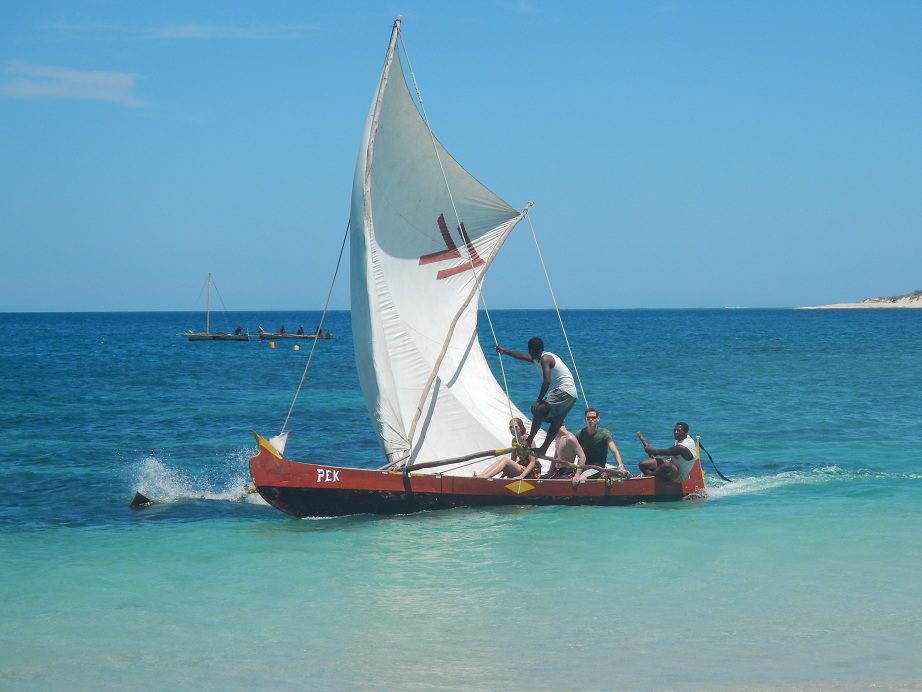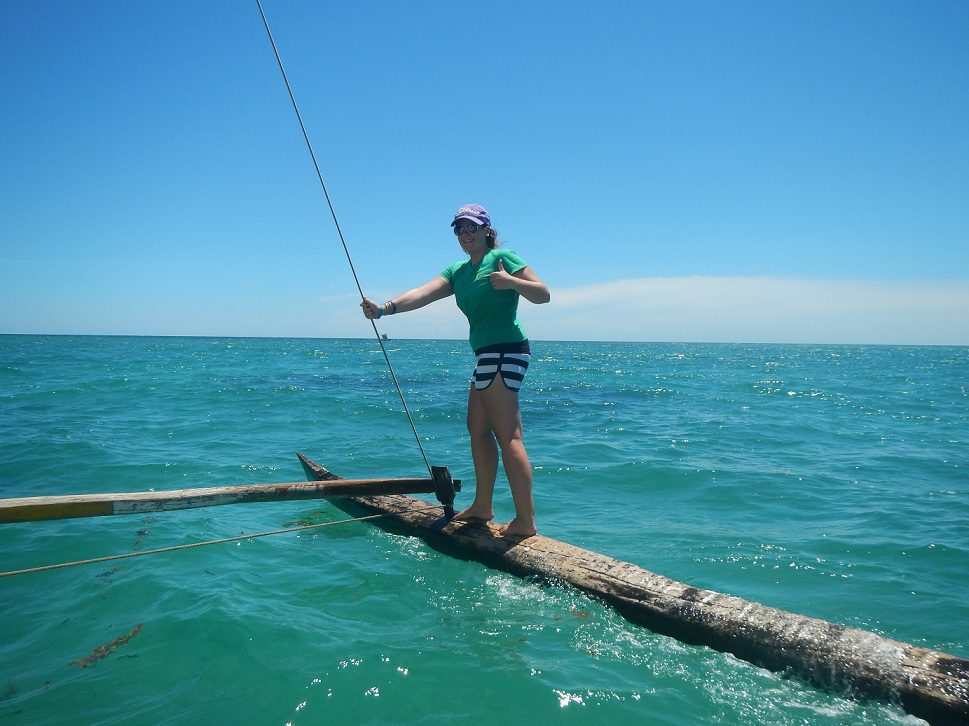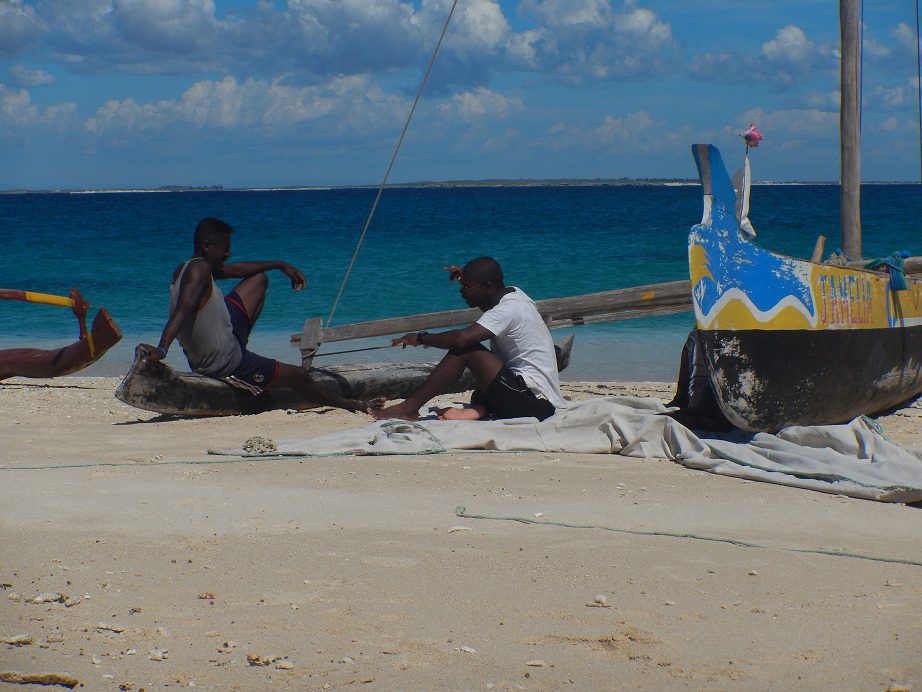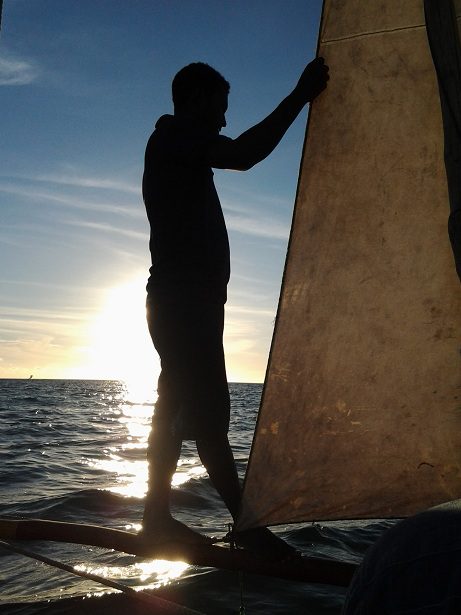By Madison Kane, Expedition Manager, Andavadoaka, Madagascar
If you stand at the top of the hill at Coco Beach (the base for Blue Ventures’ expedition volunteers in Andavadoaka) and admire the village down below, you see hundreds of wooden canoes with out-riggers and square canvas sails called ‘pirogues’ lined up along the beach.
Every morning in Andavadoaka we wake up to fishermen raising their sails, judging the winds, and heading out to catch food for their families. Most of the Vezo (Madagascar’s “people of the sea”) have their own pirogues, which they have built or bought, and custom-painted to their liking.
Many have sayings, vibrant designs or even something like the iconic Three Horses Beer logo painted on their hulls or sails, and all pirogues have a name painted along the side. They are an efficient mode of travel that not only creates a beautiful image of villages in southwest Madagascar, but is essential to the Vezo way of life.

Away we go!
Blue Ventures’ expedition volunteers have one day off per week from their normal diving schedule to relax and enjoy many of cultural experiences that Andavadoaka has to offer. One of the greatest ways (in my opinion) to spend the day off is to hire a pirogue and sail to one of the nearby islands for a snorkel and a picnic.
Recently, the volunteers of the current expedition and I asked our brilliant kitchen chef, Tiana, to make egg sandwiches using his daily homemade bread so that we could enjoy it during our “Sunday sail”. We all set off around midday with a few local Vezo sailors and their pirogues. Knowing Jamelia as the pirogue that wins all of the local races, and owned by local friends of mine, I jumped on that one and a few other volunteers followed.

Learning to balance wasn’t easy!
Despite the summer heat of Madagascar, we enjoyed a nice relaxing sail to a local island called Nosy Fasy (meaning “sand island”). Part of the experience is learning to weigh down the pirogue by standing on the balance bar – a difficult task for those lacking balancing skills. However we managed, and of course, arrived first to the island… incredibly ready for a snorkel.
Due to the shallow depths (<2m) and spectacular visibility, volunteers were able to practise their science point-outs; naming hard corals, anemones, butterfly fish, triggerfish, parrotfish and more on the beautiful, shallow reef off the island.

Relaxing on the beach after a hard morning’s sail
Our snorkel was followed by a lovely lunch with music, a mid-afternoon snooze (which the Malagasy have mastered) and a wander around the island, which at low tide is 338 paces, according to one volunteer. After a few hours, we sailed our way home – learning how to tack, steer the boat with a paddle, tie a few boat knots, and keeping our balance.
The local fishers were happy to teach us how travelling by pirogue is done, which isn’t quite as easy as they make it look! And of course, like sailing anywhere in the world, sailing is “arakaraky tsioke” – it all depends on the wind. Since we had the wind behind us on the way home, it was a breezy and quick ride back to Andavadoaka. As part of all expeditions, volunteers will be given the opportunity to take sailing lessons with a local fisher – learning how to sail like a Vezo, or even just to sit back and relax on a day off!

A perfect way to spend your day off
For a few ariary which helps to support the local community, I would say that a sail and a snorkel is one of the best ways to spend an afternoon off in Andavadoaka. Even after living here for over a year, I always return learning something new and end my day with a smile on my face – it’s an experience every vazaha (or visitor) should consider, at least once, whilst volunteering in Andavadoaka… just don’t forget your sun cream!

